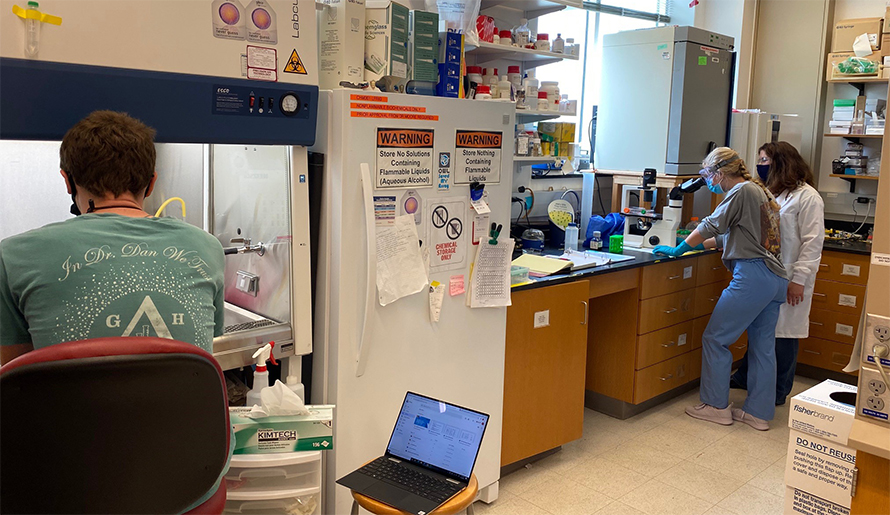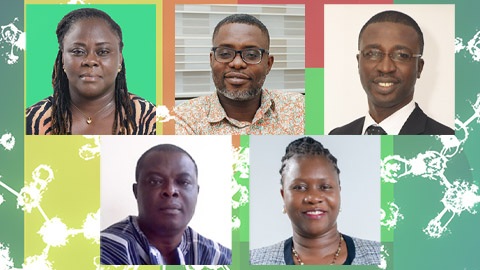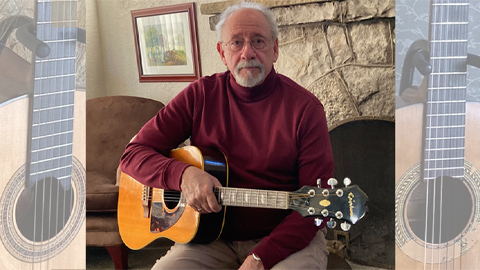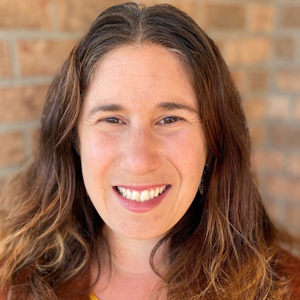The ups and downs of teaching in a pandemic
I am an associate professor in the chemistry department at Elon University. I teach undergraduate students and have an undergraduate research lab. We currently are operating on campus.
The university has put protocols in place for faculty, staff and students: wearing masks on campus when indoors or outside if we are unable to maintain 6 feet or more distance, wiping down work stations when we finish, limiting student numbers in a classroom or lab based on the size of the room. Wipes and hand sanitizer stations are in every classroom, and most classrooms are upgraded with cameras to record or livestream class through Zoom or Webex.
The university is administering COVID-19 tests at random each week and posting results on a dedicated website. On that website we also can find total numbers of student and faculty cases, how many students are in quarantine (at least one entire dorm is dedicated to quarantine) and how many days’ supply of wipes, hand sanitizer and other supplies are on campus. We get a weekly update from the vice president of communications with info about the situation.
The administration instructed the faculty to set up our courses so we could pivot quickly to fully remote, if needed, and encouraged hybrid or flipped classrooms. The Center for the Advancement of Teaching and Learning and the teaching and learning technologies department staff provided several three-day online sessions in late July and early August for faculty to learn about best practices for hybrid and remote teaching, and faculty were incentivized to participate with a small stipend.
Due to limits on how many students can be in a classroom, many faculty can have only half of their class in person at a time. I have adapted my class to be hybrid, with half the students attending on Monday, the other half attending on Wednesday; we are all remote and meet during class time on Zoom on Fridays. I prerecord lectures using an electronic white board and post 20- to 25-minute lectures of material on Moodle and then use in-class time to answer questions and dive deeper into the material. I record and post each in-person session so the other half of the class can view later what occurred. I don’t use the whole class periods on Monday and Wednesday, because the students have video lectures to watch and other projects to work on for our Friday meetings, which usually are reserved for group work and presentations.

I am framing my entire medicinal and pharmaceutical chemistry course around COVID-19. For example, instead of looking at random clinical trials, we are using COVID-19 clinical trials to learn about trial phases. Also, one topics project is centered on COVID-19 topics, and I will introduce major principles of pharmacokinetics and dynamics using drugs that are being used to treat COVID-19 patients. I also adopted a grading contract policy with less emphasis on points and more emphasis on doing a good job and learning the material. Students will take all exams synchronously online through Moodle.
We are teaching the general chemistry lab sections in pods — groups of nine students that cycle through in-person labs, virtual prerecorded lab videos with data analysis and off weeks so we can get all the students in person for a few hands-on labs.
I had to purchase my own voice projector/microphone, as the university did not supply one. It is absolutely necessary when trying to teach with a mask on. All office hours are through Zoom.
I have one lecture student who is completely remote; students with health concerns could apply for this option but had to be vetted through a committee. I assigned this student an in-person buddy. I also have one virtual lab student who uses prerecorded video lectures for all the labs — the chemistry department paid a few student workers to run through all of the fall semester general chemistry labs and record them for virtual students or in case the entire university has to transition to all remote.
The upside
My research lab is forging ahead as usual but with masks on and limiting the number of people in the research space at any given time. We are interested in understanding chemoresistance and chemosensitivity in different types of cancer, specifically looking at apoptosis and mitochondrial metabolism. I’m grateful that this aspect of the fall semester is undisrupted.
Committee work has been reduced to essential work only. Curriculum committees are reviewing proposals for new courses to be taught this academic year but not taking on programmatic review or five-year planning that ordinarily would be done. All committee meetings are online.
After taking the initial extra time and effort to figure out how I would teach hybrid courses, the fall semester has been a little easier than normal for me, being a mom of two school-aged children. I can record lectures whenever and from wherever I want. With office hours on Zoom, I don’t have to go to my actual office; I can be at home with my kids after school hours. The same holds for committee meetings — I can be at home and be working.
My prerecorded lectures allow me to focus on student understanding when we are in person rather than just delivering the concepts, which is actually really nice from a pedagogical standpoint. I also don’t feel the pressure to give a performance, because I am sharing small snippets of material. I can have all of my notes and the textbook laid out in front of me, and I always can pause the recording if needed.
We never would have explored these new ways of conducting the semester had there not been the pandemic. We have learned we don’t need to be together physically to be productive, which offers flexibility to working parents. Once we are back to normal (not wearing masks and without a strictly limited number of students in the classroom), I hope that we can retain some of the practices we’ve put in place. I certainly will consider continuing the flipped lecturing and grading contracts for my courses in the future.
Enjoy reading ASBMB Today?
Become a member to receive the print edition monthly and the digital edition weekly.
Learn moreGet the latest from ASBMB Today
Enter your email address, and we’ll send you a weekly email with recent articles, interviews and more.
Latest in Opinions
Opinions highlights or most popular articles

Getting to know scientists half a world away
In a program at Wellesley College, students interview and write about researchers at a university in Ghana.

Let’s make ASBMB awardees look more like BMB scientists
Think about nominating someone outside your immediate network.

A paleolithic peer review
You might think review panels have only been around for the last century or so. You would be mistaken.

Early COVID-19 research is riddled with poor methods and low-quality results
The pandemic worsened, but didn’t create, this problem for science.

So, you went to a conference. Now what?
Once you return to normal lab life, how can you make use of everything you learned?

My guitar companion
A scientist takes a musical journey through time and around the world.

